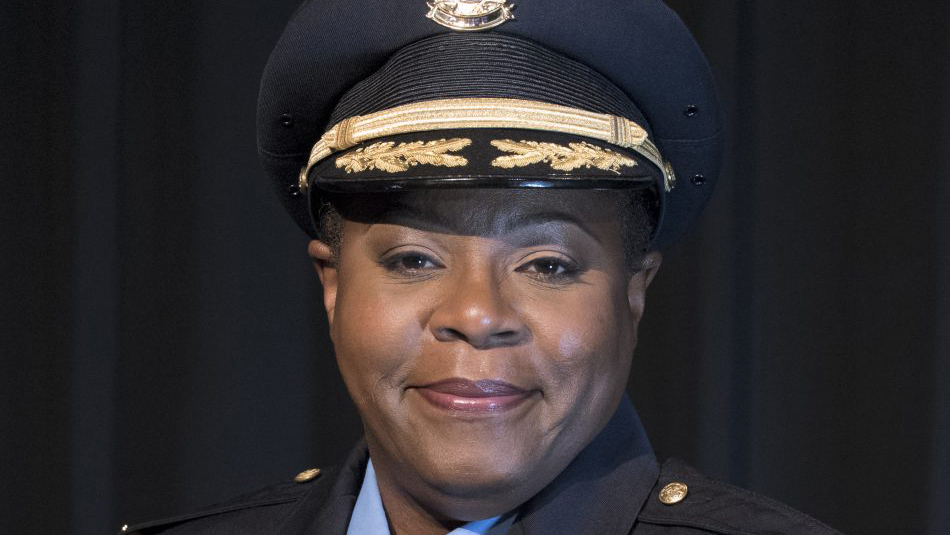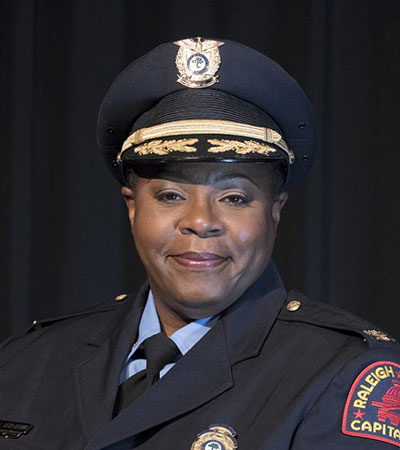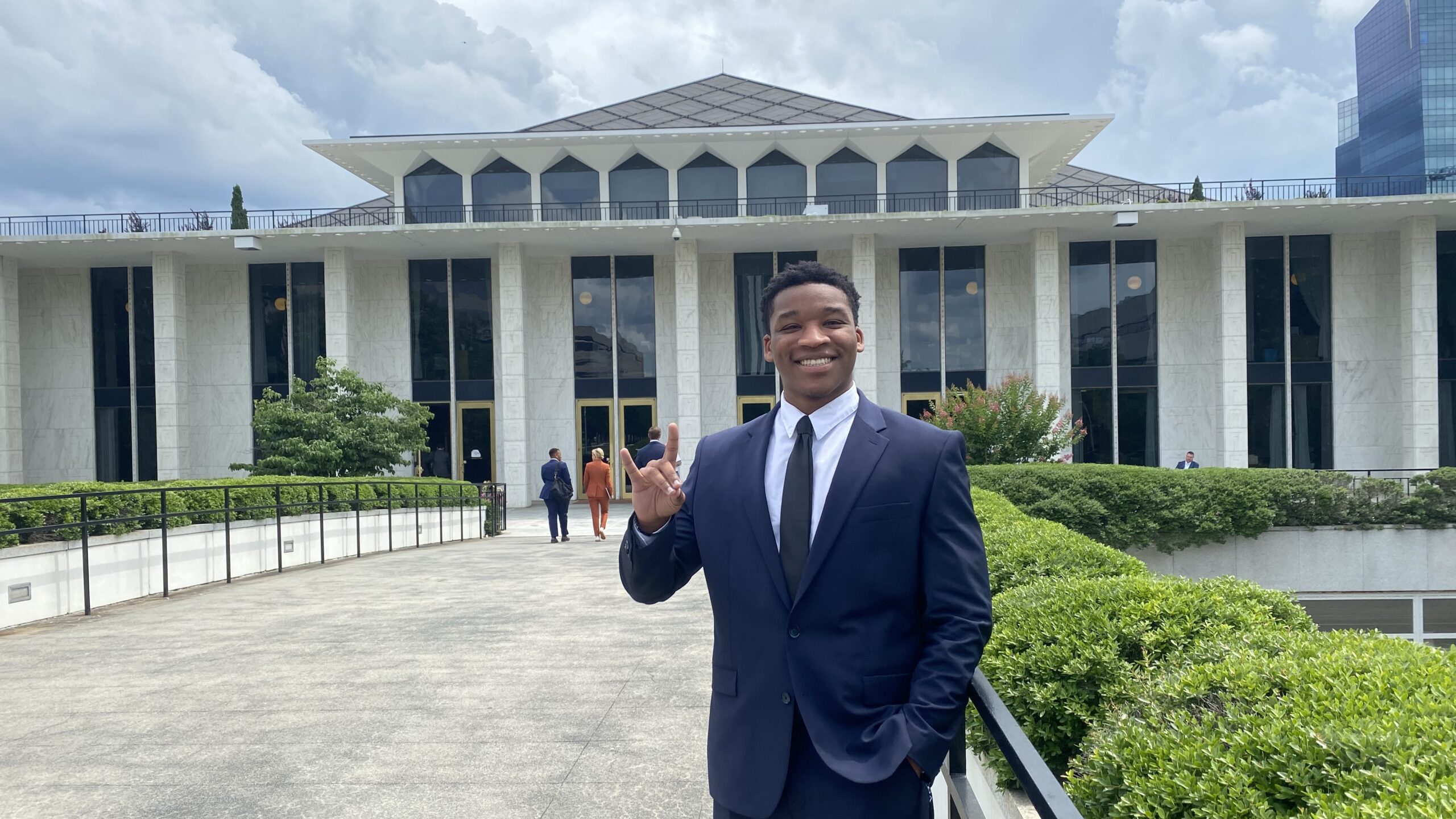Diversity in Law Enforcement: 5 Questions With Raleigh’s Chief of Police

In 1987, a young woman from the farming community of Bunn, North Carolina, came to Raleigh bearing a freshly minted degree in criminal justice from East Carolina University, with her heart set on being a police officer. Right away she enrolled in Raleigh’s Police Academy, one of four women out of a class of 20 — and one of only two African-American women. She may not have planned on becoming the department’s first African-American woman to attain the rank of sergeant, the first woman to command a Raleigh police district, and the first woman to attain the rank of major, but she achieved those milestones in the years to come as she rose through the ranks. She also earned a master’s degree in public administration from NC State along the way. Her achievements culminated 26 years after her arrival when Cassandra Deck-Brown became the first African-American woman to be named Raleigh’s chief of police.
Chief Deck-Brown is coming to NC State on Thursday, Feb. 7, to deliver the 2019 Humanities and Social Sciences Diversity Lecture, titled “The Importance of Inclusion and Diversity in Law Enforcement.” She will speak from 5 to 6:30 p.m. in the Coastal Ballroom in Talley Student Union. The lecture is free and open to the public.

In an interview this week, Chief Deck-Brown discussed the role that community engagement plays in effective policing, how her graduate degree from NC State helped prepare her for her current position, and how the department responds when an officer is wounded in the line of duty.
The title of your upcoming lecture at NC State is “The Importance of Diversity and Inclusion in Law Enforcement.” What do you plan to speak about?
I want to discuss how police officers are public servants, so it’s important for us to do our best to represent the community we serve. As chief, I’ve made that a constant goal of ours, both in our recruitment efforts and in everything else we do. Departmental staffing is part of how we address that, but we also want to make sure that the programs we provide, like youth programs, are diverse and inclusive of the greater community. That will afford us an opportunity to engage with community members who might not otherwise engage with law enforcement. We don’t get to choose those we serve, but we do need to understand who we serve.
You’re the first African-American woman to serve as Raleigh’s police chief. Has that fact affected your tenure as chief? If so, how?
I don’t know that who I am has affected my tenure as chief, but it does speak to the city’s willingness to give me that opportunity. I don’t take it for granted. I recognize the importance of the role. It gives me the opportunity to tell a more complex story about diversity and inclusion, particularly when it comes to recruiting. Me being in this position allows others to see that it can happen. And not only within the department, but for other opportunities out in the world as well. What about that little girl or little boy out there who doesn’t think a role like this is an opportunity for them? My situation tells a different story. It says that they can be a chief of police or a woman in leadership.
Internally, it tells the rest of the department that there’s an opportunity for succession. As a woman — and as a woman of color — I provide an opportunity for them to not only see what the chief does and how she’s doing it, but also to consider whether they might want to do something similar. I take the time to meet with officers and talk about next steps and what that commitment could look like down the road, answering those questions that they may not have thought to ask anybody without someone like me opening that door.
You earned a master’s degree in public administration from NC State. What was your experience at State like, and how do you feel your degree helped to prepare you for your current position?
When I came to the Raleigh Police Department, I started out as a patrol officer, like everybody does. I had graduated from East Carolina, but I wanted to seek more education, another opportunity to learn, so I applied to the Master of Public Administration program at NC State. I had a really great experience at State. The program is a great program. What I saw was a university that’s clearly on the map, and it’s here in the city where I serve as an officer. I felt that this degree would serve me down the road, and I was right. As I worked my way up through the ranks, I was able to use many different elements of what I learned in my program, depending on the position: personnel management, budgeting, organizational theory, research methods, and the list goes on. It all took my undergraduate education to the next level. I’ve relied on those things throughout my career since then.
When you were sworn in as chief of police in 2013, you said you planned to focus on juvenile crime. How have you acted on that plan?
Our focus on juvenile crime is not just an attempt to decrease crime. We’re also trying to prevent crime by engaging our youth and making a positive impact on our community through mentoring and other programs that build positive relationships between the youth and the department. That means while we are fighting crime, we are also talking to kids in our elementary schools, running our mentoring baseball league, running our Leadership program for boys and G.I.R.L.S. camp, and showcasing our Junior Police Academy. Those programs have allowed us to expose young folks to opportunities they may not have had before. We take kids to visit local colleges to expose them to the idea of going to college. We have partnered with companies like IBM to introduce young folks to STEM, to show them it’s not a topic to be afraid of or shy away from, but to embrace these areas and even have fun with them, like with robotics.
We also have officers who take underserved youth to the North Carolina coast for Take A Kid Fishing Day every year. In many instances, this is the first time these young people have gone fishing. Sometimes it’s their first time to see the ocean. With so many of our programs, these officers have committed themselves to making a significant impact on these kids by being mentors, coaches, and support systems for them.
We’re conducting this interview at a difficult time for the Raleigh Police Department. A few weeks ago, Raleigh police officer C.D. Ainsworth was shot and seriously wounded while investigating a reported carjacking. How is Officer Ainsworth doing, and how do you, as chief of police, respond to an incident like this?
Officer Ainsworth is in stable condition. His recovery will be a slow process. His family would like to thank everyone for their continued support, well wishes, and generosity. They are focused on and hopeful for a full recovery. We’re supporting him and his family. It was a significant injury, and the recovery will be significant too.
When I get that phone call, the first thing I do is pray and hope for the best, and sometimes I cry. The important thing is getting to that hospital right away and finding out the status of our officer. Then we work as best we can with the medical staff to provide them with as much information as we can. Then we get the family there, and we put ourselves in a support role for them, for the medical staff, and for each other. We all form a uniquely blended family as we pull together to support the wounded officer.
This kind of event is a gut punch that affects all the officers, not just the ones on the scene. But we are a 24/7 operation, and we have to continue to serve and protect the greater community. That means making sure all of our officers are going to be okay and can get through this. We have a civilian support staff that is part of our family, and they’re affected, too. Then you have the families of these employees and officers. Making sure resources are available for them is just as important.
We’re fortunate to have a lot of resources to help us do that. We have a police psychologist and a trauma counselor; both of them are full-time employees on staff. We’re fortunate to also have a chaplaincy program in our department, and they, too, play a role in our healing. Additional support is available through other city resources and benefits and via the law enforcement network.
In the middle of all this is an investigation that has to happen as well. Although there are a lot of moving pieces, I’ve received strong support. That is what is needed and appreciated at a time like this. This is what family does. This is what community does. The outpouring of love and support we’ve received from the community has been overwhelming.
It takes all of that to get us where we need to be. And we’ll get there.
This post was originally published in NC State News.
- Categories:


